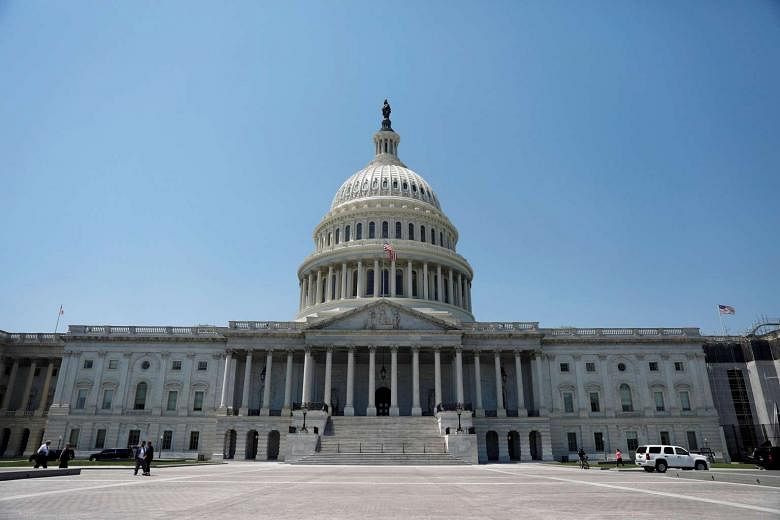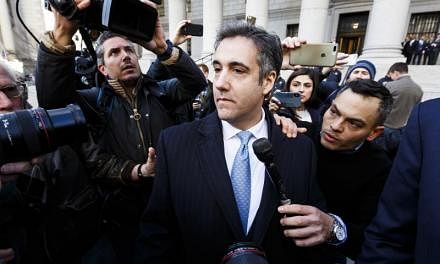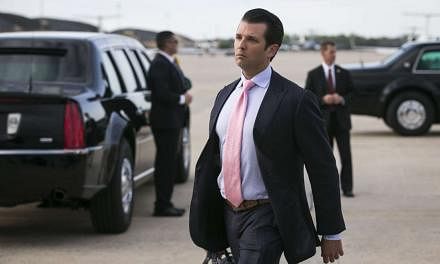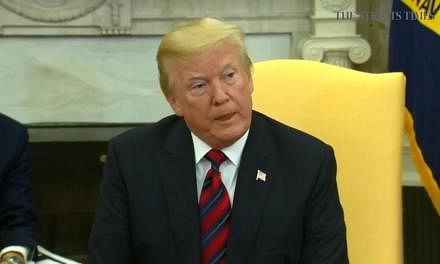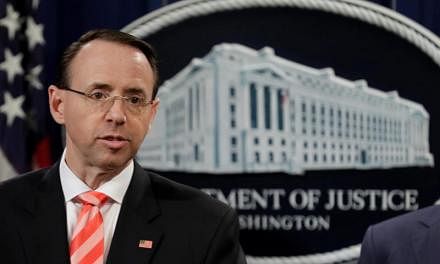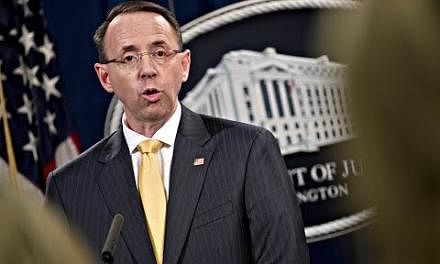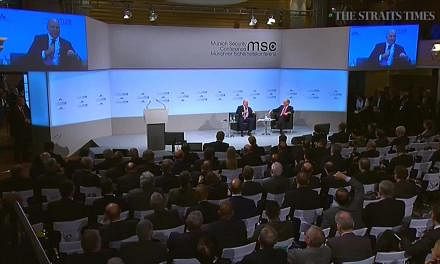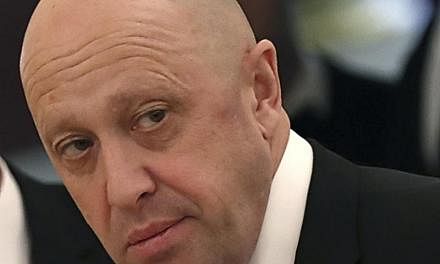WASHINGTON (Washington Post) - No Democrat was in more demand Wednesday (May 17) than Texas Rep. Al Green - the seven-term Democrat from Houston who held a hometown news conference two days before calling for the impeachment of President Donald Trump.
Then came allegations that Trump had pressured the FBI director to beg off a criminal investigation of his then-national security adviser - and then came the media.
Green delivered a morning floor speech on impeachment ("with a heavy heart, with a sense of duty"), then spent nearly an hour just outside the House chamber, walking from camera to camera near the Capitol's statue of Will Rogers where TV networks set up their satellite links.
"It's about the fact that the president has committed obstruction of justice," Green, a former trial lawyer, said in an interview. "It is indisputable that he fired the FBI director. It is indisputable that he said he considered the investigation that was taking place - of the president - when he fired him. And it's indisputable that he went on to tweet what might be considered intimidation, words that are intimidating."
For much of a frenzied day, Democrats and Republicans were asked not just if there needed to be further investigations of the president, but if impeachment, a power Congress has used against just three of its 45 presidents, was on their minds.
It was unclear how the Justice Department's decision to appoint Robert Mueller as a special counsel to oversee allegations of Russian meddling in the election would impact such talk.
As of earlier Wednesday, neither party's leaders want to talk about impeachment. But neither party could seem to avoid it.
"I think that we ought to keep our focus on finding out the facts," said Rep. Adam Schiff, D-Calif., the ranking member of the House Intelligence Committee, at a morning news conference meant to tout the Democrats' campaign to form an independent commission on the FBI scandal.
"No one ought to, in my view, rush to embrace the most extraordinary remedy that involves the removal of the president from office."
The impeachment talk had already begun at the fringes of the Democratic Party before this week - Rep. Maxine Waters, D-Calif., was leading the charge. But despite the Mueller announcement, the noise grew louder after news that ousted FBI Director James B. Comey took notes of his conversation with Trump in which the president asked Comey to drop the investigation of former national security adviser Michael Flynn, according to Comey's associates.
As with so much of Congress's agenda, whether to talk impeachment seems to have been a choice that outside forces had already made for lawmakers.
At a Monday night town hall sponsored by CNN, House Democratic leader Nancy Pelosi, D-Calif., was prodded on the impeachment question, and stayed with the party's message - an investigation would uncover facts, and impeachment made no sense without it.
"If you are talking about impeachment, you are talking about 'What are the facts?'" she said. "What are the facts that you would make a case on? What are the rules that he may have violated? If you don't have that case, you are just participating in more hearsay."
For that, Pelosi was flayed on Twitter by left-wing accounts. And by midweek, the progressive group MoveOn.org was texting members, urging them to ask their representatives to "start an independent investigation into whether Trump obstructed justice and begin impeachment if he did."
Democratic candidates for other offices, like Illinois gubernatorial hopeful J.B. Pritzker, were flashing their progressive bona fides by calling for impeachment.
"Calling for impeachment is not something done lightly, but I believe it's necessary to protect our country's national security and democracy," Pritzker wrote on Twitter. "There are credible reports that Donald Trump has obstructed justice in the investigation of the Russian hacking of our democracy."
Pelosi, who led her party to control of the House from 2007 to 2011, had heard the impeachment drumbeat before. The 1998 impeachment of Bill Clinton, which led to a failed removal vote in the Senate, left Democrats with bitter memories.
Throughout George W. Bush's presidency, activists called for his impeachment. In 2006, Pelosi repeatedly said that impeachment was "off the table," and in the end, all activists got from the campaign was a day-long hearing where one witness suggested that Bush should, rather than face impeachment, be tried for murder.
But "the I-word," as Rep. Joseph Crowley, D-N.Y., called it Wednesday, remains the gold standard when presidents tumble into scandal."Maybe it's the shock value," said Sen. Brian Schatz, D-Hawaii, a progressive who spent part of the day batting back impeachment questions."Most people calling our offices are asking for a special prosecutor," said Sen. Chris Van Hollen, D-Md., the chair of a Democratic Senatorial Campaign Committee that has to defend 10 senators from Trump-won states next year.
Republicans, who egged on impeachment talk in the Bush years, are cautiously sounding the same notes now. In an email to donors, headlined "Sabotage," the Trump reelection campaign warned conservatives of a campaign to bring down his presidency.
"You already knew the media was out to get us," the email read. "But sadly it's not just the fake news . . . There are people within our own unelected bureaucracy that want to sabotage President Trump and our entire America First movement."
In conservative media, coverage of Green's speech was sometimes apocalyptic. On Fox News, the story was "Dems, Media Bring Up Impeachment." At the other end of the pro-Trump spectrum, the fringe site Infowars informed readers that "Impeachment of Trump Could Lead to Mass Riots This Summer."
Rep. Jan Schakowsky, D-Ill., who co-sponsored impeachment resolutions against Bush and against former vice president Cheney, said that the politics and realities of 2017 were completely different.
Trump struggled to win over Republican leaders up until he won the presidency - and she thought a botched lunge at his presidency would firm up Republican support in a more partisan media environment than Clinton or even Richard Nixon ever faced.
"They're saying, oh, this whole thing is proof that Democrats lost the election, and they want to find another way to get rid of Trump," said Schakowsky.
"What we need is a bipartisan or nonpartisan look at this, so there's a consensus about where we go. Maybe impeachment is where it ends up. But transparency and independence is where to focus right now."
Rep. James Clyburn, D-S.C., who said that "nobody" in his district was asking for an impeachment, was just as wary about the media dynamic.
"There are a lot of Republicans that think that no matter what this person does he ought to be allowed to do what he wants to do, that he has the authority to hire and fire," he said. "I think that we ought to wait to see where the facts will lead us."
Still, the impeachment question made news whenever it was asked. On Wednesday, after a meeting of the House GOP Conference, Rep. Justin Amash, R-Mich., raced up the stairs of the Cannon House Office Building, fielding questions from a stubborn pack of reporters. He was just one of two Republicans open to a special probe of the fallout from alleged Russian meddling, and reporters tested how much further he could go.
"If the allegations are true, would they be grounds for impeachment?" asked one reporter."If the allegations are true, yes," said Amash.
"But everybody in this country gets a fair trial, including the president, or anyone else."
For the rest of Wednesday, Amash - an iconoclast who wrote in Sen. Rand Paul, R-Ky., for president - was famous. The Hill ran a news alert: "First Republican raises impeachment for Trump." A video of Amash answering the question bounced over Twitter.
Meanwhile, Mother Jones reported to its progressive audience that Amash was the first Republican to suggest that "Trump may have committed (an) impeachable offense."
The magazine updated its item after a spokesman for Rep. Carlos Curbelo, R-Fla., said that he, not Amash, was the first to mull over impeachment - after a reporter asked about it.

